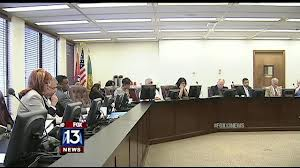
MEMPHIS, Tenn. (AP) - Leaders of an attempt by six Memphis suburbs to start their own public school systems are considering how to respond after a federal judge halted their effort.
U.S. District Judge Samuel Mays ruled Tuesday that the state law allowing voters in the six Shelby County municipalities to decide if they wanted their own school districts violates the Tennessee Constitution because it applies only to one county.
The ruling was a key development in the ongoing battle over the future of public schools in Tennessee's largest county. It throws out the Aug. 2 vote to create school districts in Arlington, Bartlett, Collierville, Germantown, Lakeland and Millington.
The suburbs want to break away from the Shelby County school district and avoid the planned merger between the larger, struggling, majority-black Memphis school system and the smaller, more successful, majority-white county system. Suburban voters had chosen to raise taxes to pay for the new school systems.
Passed by the Republican-led General Assembly earlier this year, the state law was challenged by the Shelby County Commission and the city of Memphis. They both want to preserve the merger set for 2013, with the six municipalities included in one consolidated school district with 150,000 students.
Republican Senate Majority Leader Mark Norris of Collierville, who led the suburbs' effort, said Wednesday that his office is "still digesting the court's ruling."
Norris said he could see legislation proposed in January to address some of the court's concerns, but no legislation to stop the merger has been discussed.

"We're weighing the options," Norris said.
Arlington Mayor Mike Wissman said the suburbs also were considering options, including whether an appeal would be prudent. Suburban mayors plan to meet in coming days to discuss ways to move the case forward, Wissman said.
"The one good thing we know is we've already heard from our citizens loud and clear, even if the election is thrown out, what direction they want us to go in regards to education," Wissman said.
Lawyers on both sides also are preparing new arguments concerning another state law that lifts a statewide ban on the creation of municipal school districts after the merger between Memphis and Shelby County schools is completed in the summer of 2013. Mays has asked for both sides to submit arguments by the end of December.
The suburbs had been planning to start their school districts in time for the 2013-2014 school year. But Mays' ruling makes it much more difficult for the suburbs to have their own systems by then.
"What this ruling makes clear is that there will be at least one academic year of unification," said Steve Mulroy, a Shelby County Commissioner who is against the municipal school districts.
If Mays should rule that the lifting of the statewide ban after the merger is permissible, then the suburbs could move to create their own school districts for the 2014-2015 school year.
The General Assembly also could attempt to write a new law. Mulroy said such an attempt may not work.
"I don't think the political will is there to do this statewide," Mulroy said. "When they tried it in 2012 to do it statewide, legislators, including Republican legislators from Middle and East Tennessee, said, 'No, we don't want this affecting our counties, we don't want municipal school districts.' They had to specifically change so it only applied to Shelby County in order to get it passed."
Mays also postponed indefinitely a Jan. 3 trial to address claims by the county commission and the city of Memphis that the municipalities want to avoid the merger on racial grounds.
The commission argues that the municipalities' school districts would be majority-white, essentially creating a segregated school system.
Lawyers for the municipalities have said allegations of racial discrimination were unfounded and untruthful. Suburban mayors have disputed the claims, as well.
Democratic Senate Minority Leader Jim Kyle of Memphis lauded the judge's ruling blocking the public school systems and his decision to continue the January trial.
"I believe that there should be a full hearing on that particular issue," Kyle said. "There's a lot of folks that believe" those claims.
Copyright 2012 The Associated Press.
